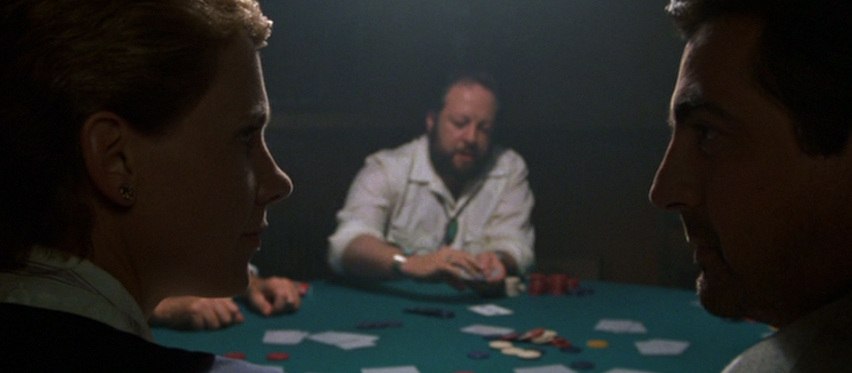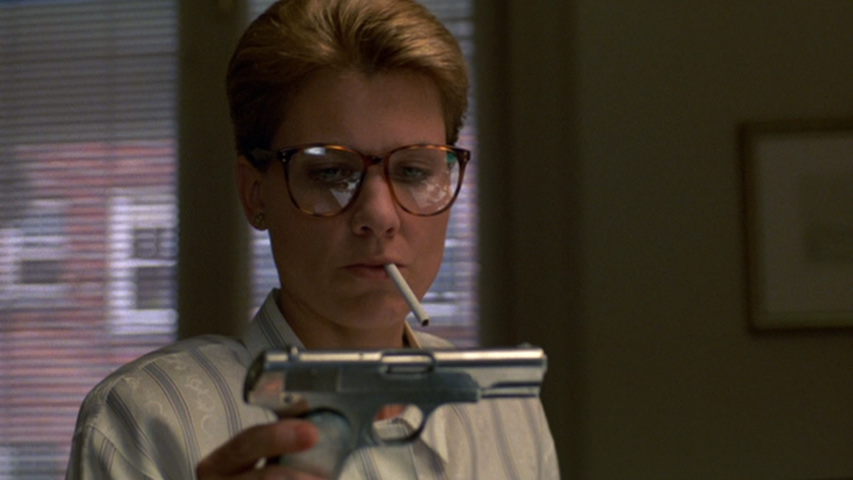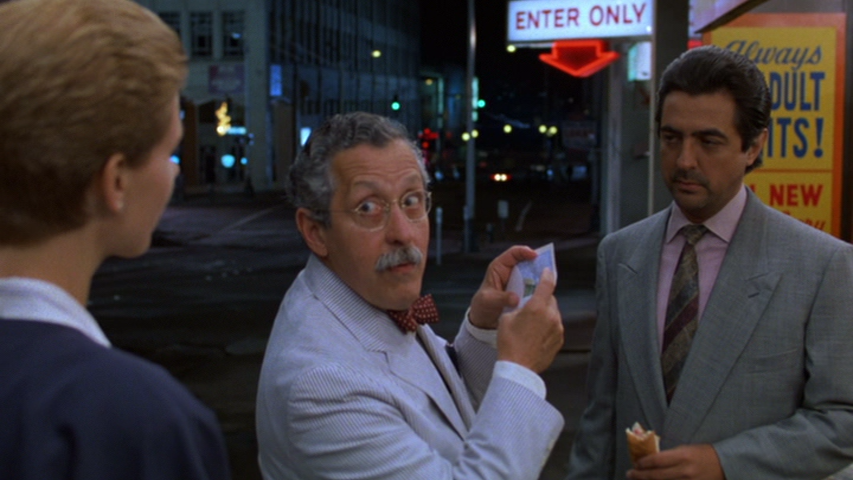

“It’s called a confidence game. Why? Because you give me your confidence? No. Because I give you mine.”
David Mamet cut his teeth as a playwright and screenwriter throughout the 1970s and early 1980s before trying his hand as a film director. His directorial debut, House of Games is a clever piece of narrative trickery, duping the viewer just as easily as the victims of the conmen who gather at the titular pool hall. Just like the tricksters portrayed, Mamet entertains with one hand while manipulating things out of sight with the other. It is only as the story unfolds that we gradually discover just how large the scope of the magic trick really is. The precise dialogue, restrained storytelling, and sparse sets create a startling psychological thriller where even the best-selling psychiatrist is drawn in by the art of the con.
The film stars Lindsay Crouse as Dr. Margaret Ford, a psychiatrist who decides to confront the gambler who has pushed one of her client’s to thoughts of suicide. Crouse plays the character straightfaced, stoic and ambiguous for much of the runtime. She has written a book about obsessive compulsion, and betrays little to no emotion, suggesting that she has herself under control at all times. This threw me off as Crouse’s performance seems quite mechanical. She hardly smiles, and her dialogue is delivered in monotone, like she is reciting lines from memory without any additional bandwidth for actually acting.

She enters the House of Games and confronts Mike Manusco (Joe Mantegna), a fast-talking wise guy. He offers to forget her friend’s debt if she helps him out. He is in the middle of a poker game, and his adversary George (Ricky Jay1) is a card sharp from Vegas who has been cleaning up all night. But he has a “tell”—whenever he is bluffing he plays with his class ring. Unfortunately, George had noticed that Mike picked up on it, and stopped doing it. The favor that Mike asks is that Dr. Ford watch for the tell when he leaves the room. That way he can win his money back and gut George of all his winnings. All goes according to plan: Mike excuses himself to use the restroom, George plays with his ring, and Mike calls his bluff. Except, he’s not bluffing, and now Mike owes George six thousand dollars which he does not have. When the money is not immediately forked over, George grows angry and pulls a gun, demanding he be paid at once. Since Ford had seen the tell with her own eyes, she had agreed to back Mike with her own money, and under the threat of the gun pulls out her checkbook and begins filling one out. George, now satisfied that he will get his winnings, places his gun on the poker table where it begins to… leak. (“I told you a squirtgun wouldn’t work.” “A squirtgun would have worked. You didn’t have to fill it.” “What, am I gonna threaten someone with an empty gun?”) The act is up. Mike, George, and Joey (Mike Nussbaum) apologize halfheartedly. “It was only business,” they say. “It’s the American way.” Dr. Ford laughs at the situation, seemingly unoffended by the honest fessing of the conmen.

Margaret realizes that her work as a psychiatrist gives her a lot in common with the conmen—much of her job revolves around falsely gaining the trust of others. Her friend and mentor, Dr. Littauer (Lila Skalia) is sounding board for Margaret’s complaints regarding her lack of fulfillment and happiness. She does not find meaning in her endless observation, note taking, and questioning. She does not feel that she is actually helping her patients. Dr. Littauer proposes that Margaret do something that she particularly enjoys, just for the sake of enjoying something. So that night Margaret returns to Manusco’s House of Games, where she proposes that he allow her behind the scenes of his game so that she can write a book about the psychology of a conman. She is attracted to the charismatic self-described “bad man,” and her descent into his shady world is accented by the carefully placed markers of her own internal battles. Though Margaret appears in control, she also chain smokes, frequently slips incorrect possessives into her speech, and claims to have written her best-selling book from personal experience.
Things escalate when Margaret and Mike spend an evening together in a hotel room, and he has to bring her along on a sting at the last minute. Things go horribly wrong, someone dies, and Mike decides to split town. But Margaret soon discovers cons inside of cons—a long and complicated plot à la The Sting (1973) to make a buck off the famous Dr. Ford. The film then gets a bit meta, suggesting that we’re all conning ourselves into accepting our own morally dubious actions.

Mamet is known as a magician with his wordplay, manipulating the meaning of words through varying contexts and repetition. Like the Coen brothers, who are known for their half-started and topically shifting sentences, Mamet is able to economically pull the audience in, liven up exposition, convey story information, and add dashes of flavor all at the same time through his dialogue. While I can appreciate the consideration evident in each interaction, I’m not entirely sure that the Mamet mystique pulled me in the way it does others. It often felt that many of the characters spoke with indistinct voices, revealing the common source of their existence. Crouse’s lines are delivered without much rhythm, as if the she had no room to own the material and breathe her own life into it, simply memorizing and reciting. It often seemed that the lines would have worked but she was so focused on getting each word right that all of the emotion fell out of the performance. Subtly, the cinematography is solid (it doesn’t look like Mamet simply filmed a play he had written), and the noir aesthetic achieved by the lighting team is superb.
Like any good magician, Mamet entertains you, letting you think you understand what he’s doing before pulling another trick out of his hat that you weren’t expecting. It’s a bit like the reveal of Keyser Söze in The Usual Suspects (1995). Mamet would go on to further success as both a writer (The Untouchables (1987), Glengarry Glen Ross (1992)) and a director (Homicide (1991), Heist (2001)). Though his debut as a director is not perfect, it is smart, and requires its audience to engage with the material and put forth a bit of thought.
1. Ricky Jay was a real-life magician who crossed over into cinema, taking roles in Boogie Nights (1997), Tomorrow Never Dies (1997), Magnolia (1999), and The Prestige (2006). He also had a recurring role in the HBO series Deadwood (2004–2006) and four other Mamet films: Homicide (1991), The Spanish Prisoner (1997), Heist (2001), and Redbelt (2008).